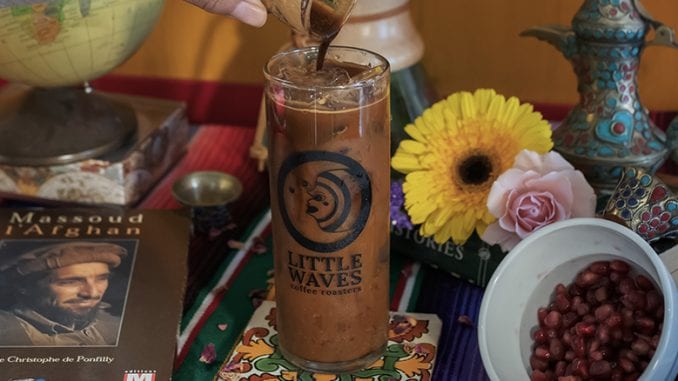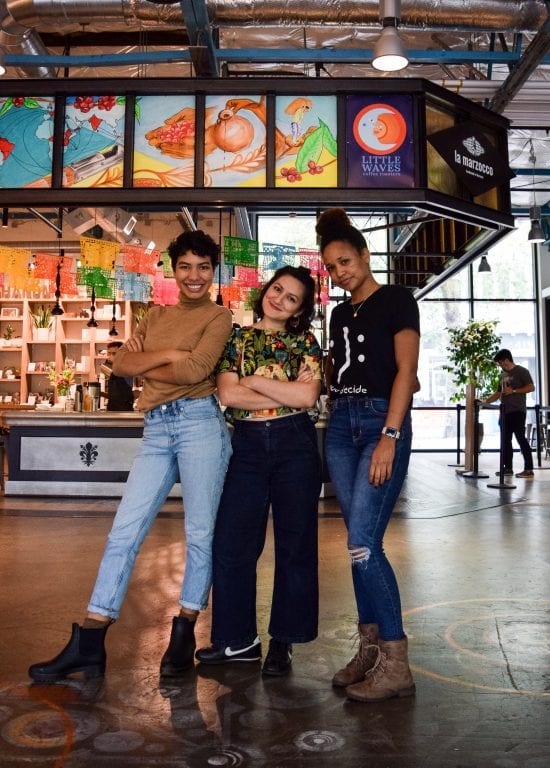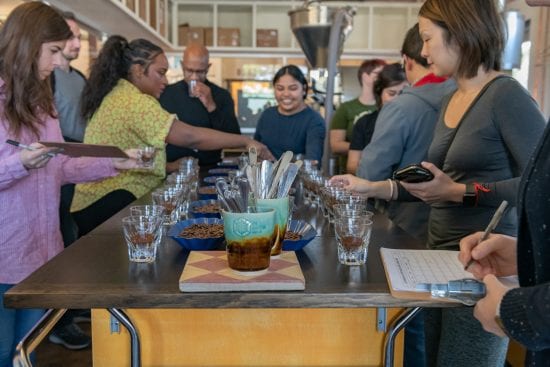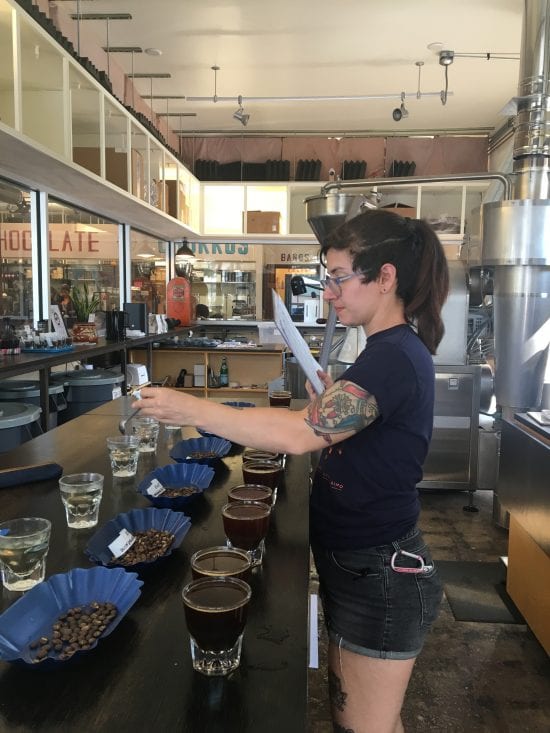
The Latinx-owned, womxn-forward café and roastery is one of Durham’s foremost culture bearers and coffee educators.
BY MARK VAN STREEFKERK
BARISTA MAGAZINE ONLINE
Cover photo by David Solow art + design, style by Alyssa Noble, Lakewood wholesale representative and communications specialist
Walk into any of Cocoa Cinnamon’s three locations in Durham, N.C., and you’ll find a place where the history and culture of coffee and chocolate are boldly told through the senses. Owners and artists Areli and Leon Barrera de Grodski draw on their family roots to weave a sensory story of flavors, aromas, textures, and language that connect coffee to those to whom it belonged pre-colonization. For Cocoa Cinnamon, or Cacao Canela, and their counterpart Little Waves Coffee Roasters, coffee is never just coffee. It is a living communion with the lands and people who produce it.

“The business is very rooted in what I like to call the Love Frequency. Mostly because it is kind of like Leon’s and mine’s love child, and it’s rooted in our cultures,” Areli says. “It’s really important to us to highlight the cultures and the people who existed before colonization, in terms of bringing to life the spices and this cacao. … Where is coffee from? How is it consumed there? Thinking about how normal it is (in Latin America and elsewhere) to sip coffee with spices in it. For us it was important to acknowledge those histories and those cultures, and share that in our menu. It’s about storytelling and honoring.”
Signage at their cafés is in both Spanish and English. Drinks like the Dark Skies of Teotihuacan (a milk chocolate drink with chipotle and cayenne pepper, topped with black whipped cream and edible glitter), Cortadito Cubano, and Palmyra (a latte with cinnamon, nutmeg, black pepper, anise, date sugar, and crushed rose garnish) all embody the origin stories of their ingredients. The Al Mokha (with house-made dark chocolate sauce and cinnamon) is an homage to the first port in Yemen that exported coffee. Drinks are also inspired by the cultures of their team members, like the Nowruz, a pomegranate soda drink with espresso, named for the Persian New Year. The Lakewood location, which houses Little Waves Coffee Roasters, sells churros, and tables are decked in oil cloth. “The design of that location is very inspired by our trip to Mexico when we went to visit family in Guadalajara and in Nayarit,” Areli says.

Cocoa Cinnanamon’s story began in 2010, the same year Areli and Leon got married. The two started the business in Areli’s mom’s kitchen in western North Carolina. In 2011, the couple moved the company to Durham, launching with “$75 in the bank,” and no access to credit. Through the support of friends and community they were able to establish bikeCoffee, their first incarnation. In 2013, they opened their flagship brick-and-mortar café on W. Geer St. as Cocoa Cinnamon. Their second location followed in 2016, and their third shop and roastery opened the next year.
Central to Cocoa Cinnamon’s mission is making coffee education accessible. Areli and Leon intend to become Q-certified this year, bringing that knowledge back to their team. They already have an extensive offering of online classes and a digital education center thanks to Michael Harwood, director of quality control and innovations, and head roaster Mandy Spirito. Mandy obtained their Q certification a few years ago, and was asked to write a blog post about it, which turned into a bigger educational initiative. “I didn’t want to write the blog post to fellow Q Graders,” they say. “I wanted people to read it and think, ‘Oh, I get this stuff now’ … I also wanted to write it because I think the cupping table can be an intimidating place for some people. If you grew up in a food desert, how are you going to know what a star fruit tastes like? (The blog) is gonna be five parts, and we’re going to do a tasting via Zoom to kind of bring it all together.”

Cocoa Cinnamon aims to foster health at every level of the supply chain. Areli is also the green buyer, and seeks out coffee from women producers like Anny Ruth Pimentel’s Loma La Gloria farm in El Salvador, and Ana Milena Claros of Colombia. An exceptional instance was buying from a lot in Nayarit. “It’s a beautiful connection with rootedness and ancestors and just being able to support producers that are from the same area that my dad is from,” Areli says. “We still have family there. Serendipitously, the coffee we ended up sourcing was all female-produced.”
Success as a business also means generating the resources to create meaningful careers in coffee for their team members. Areli notes that most of the staff are women of color or young people. Seeing first-hand the correlation between representation and more opportunity for marginalized folks in a white-dominated industry is part of their mission.
In July, a team member at the Lakewood location tested positive for COVID-19, but Cocoa Cinnamon already had a crisis plan in place. The location immediately closed and the next day everyone who worked there got tested. While none of the other team members tested positive, the staff were quarantined for two weeks as a precaution, including the roastery crew. As part of the plan, they had a back-up team in place to take over the two weeks’ worth of orders at the roastery. Everyone got paid, including the quarantined employees.
“The thing that was important for us was having open communication with everyone, the entire team, and the public, and being transparent about what happened and how we were taking care of it,” Areli says. “We have this plan and we’re happy to share it with anyone.”
A storyteller for coffee and chocolate origins, Cocoa Cinnamon is also writing new futures, helping to usher in more BIPOC communities in specialty coffee.

ABOUT THE AUTHOR
Mark Van Streefkerk is Barista Magazine’s social media content developer and a frequent contributor. He is also a freelance writer, social media manager, and novelist based out of Seattle. If Mark isn’t writing, he’s probably biking to his favorite vegan restaurant. Find out more on his website.
